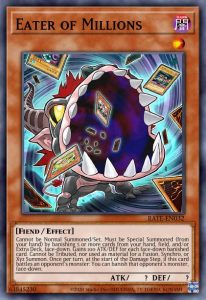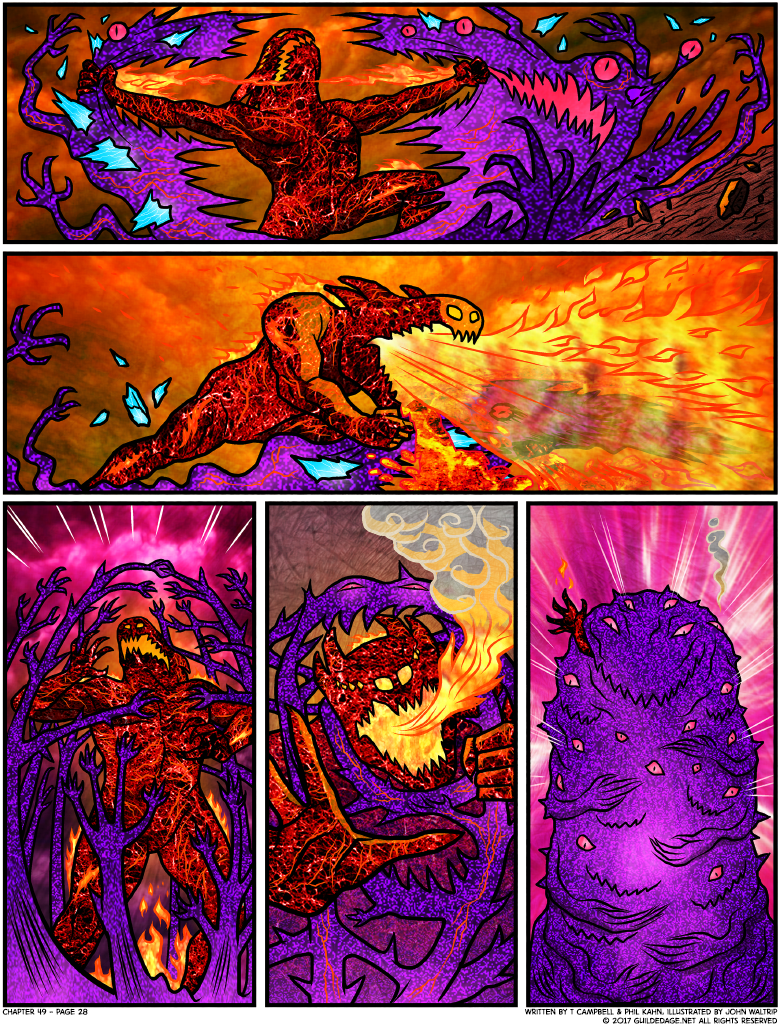Annotated 49-28
 FB: Red-Orange vs. Blue-Purple.
FB: Red-Orange vs. Blue-Purple.
RIP Tectonicus, god of change, who finally found an enemy who wouldn’t stay burned. I think that in some ways, it was time for him to go. Magda and Penk were planning on praying to him for the rest of their lives, but even though Weo assured them otherwise, the paths their lives are taking aren’t really too compatible with an “ALL ENEMIES BURN” philosophy, long-term. Sometimes being a god of change means letting some of your followers change until they leave you, I guess?
Of course, in other ways, it’s a really terrible time for him to go, since everyone in the conquered Gastonian capital is now about to die. But, you know, philosophically speaking, it’s fine.











re: the alt text I kinda wish you’d called it Tectonican heartburn XD
What really got me about Tectonicus being eaten (back when we saw it the first time) is that in the comic that follows, Penk doesn’t actually seem all that upset. He just looks a bit down, and it doesn’t last very long.
Unless I missed something (and I’ve missed some big things in this section) Penk’s and eventually Madga’s reactions are the only part of this scene that mattered. Lots of people (and I guess one god) died, but apart from Taro none of them had any narrative function and his was wrapped up back when he got hogtied.
Taro is literally having narrative function in this page, yo.
Not really, no. The tarozerker’s only personality trait it has in common with Taro is the same personality trait it has in common with every other purplezerker: It’s consumption incarnate. Without the word of author it could be any of borg-HR’s appendages and it would mean about as much.
Moving away from characterization, this entire subplot doesn’t serve a narrative function. Tectonicus is an absentee god up to this point and his death has as much impact as Zeus visibly dying in the real world would*. The taro monster winning this fight affects nothing because 1) it gets yanked away immediately and does nothing ever again, 2) it wasn’t doing anything the other purplezerkers couldn’t have done (destroy the city, kill tectonicus), 3) tectonicus’ death doesn’t /do/ anything because the world was rolling along just fine before with him doing almost nothing.
Again, the only narrative effect this has is it sort of changes Magda and Penk, and if Tectonicus hadn’t shown up at all, that would have had a very similar effect on them. If you can cut something out entirely and have the same outcome on the narrative (city gets wrecked, lots of purplezerkers get absorbed by borg-HR, Magda and Penk lose their faith…sort of), it’s not serving a narrative function.
*Except his clerics lose their power which…doesn’t really seem to matter to Penk. It matters to Magda, but she could have lost her faith just as easily of Tectonicus hadn’t shown up at all. And that’s it for narratively important outcomes.
I try not to quibble with criticism too much, and some of this is valid. But even laying Magda and Penk aside, I’d stop short of calling this sequence “without narrative function.” If we had not included a high-stakes, oh-my-God-everyone’s-gonna-die subplot in this story, then I think it wouldn’t have felt as “big” as the climax of our series deserved to feel. The Tarozerker may be its own entity (and its independence from HR may’ve been more ambiguous than we meant for it to be), but without it, the Arkerra side of this chapter might’ve been overshadowed by the previous chapter’s end of the war. Yes, the purplezerkers were still something of a threat, but with the powers of Penk, Magda, Fr’Nj, E-Merl, and Ardaic against them, they were looking kinda manageable. And yes, the main plot still has our five fighting God, but he only feels so godlike if he’s not allowed to affect anyone beyond them.
You could argue that what happens in Sepia World is also a high-stakes, oh-my-God-everyone’s-gonna-die subplot, but there was only so far we could go with that without damaging characters we didn’t want to damage. A brief threat to Xan and Shanna and a category-4 storm just isn’t in the same class as a giant kaiju fight.
Oh, and one more thing…we couldn’t make the threat to Arkerra boring! Like, if the purplezerkers had reached numbers sufficient to overwhelm the remaining heroes, that might convey the threat that HR’s influence represents, but y’all have seen plenty of faceless CGI hordes, and no zombie-uprising plot was going to top the berserker battle in Pardo’s village. A big ol’ giant-fight gets the threat across and it’s a lot more fun to look at, at least to my eye.
I’m big on character change. But “narrative effect” can’t always be measured strictly in terms of how much characters are changed at the end of it, otherwise there’d be no point in stories like Scipio’s Axemas adventure or other ultimately-avoided fates, like the Ritual of Blood Bond that Scarlett was going to put Frigg through before getting interrupted. Sometimes an action plot is about setting up what could have a really big impact and then preventing it.
Plus, I do think facing and surviving this existential threat will bring the Rebels and the conquered ex-Gastonians closer together in the end. Though that’s maybe only lightly implied in Chapter 50.
Yummy, yummy, yummy. There’s a god in my tummy
At’sa one-a spicy-a Tectonicus!
I had actually completely forgotten about this scene… and reading the re-run, still expected Tectonicus to break out of the Tarozerker again, until I read the alt-text. That course of events would be absolutely expected in this story. I mean, the Corruptor beast had its “comebacks”, and so did a lot of other characters (including, of course, the Five, but not only), so as a god, Tectonicus should be fully entitled to this sort of thing.
Also, the “power levels” of the combatants here were not too well established. Tectonicus is a god with way more followers than Frigg’s inner deity had, so he should be harder to kill. The Tarozerker, on the other hand, is some amorphous thing made out of Purplezerkers, who can be reasonably killed by fairly conventional means. That’s not to say that I find the outcome unplausible, I was just not sure if I could trust it. Which was maybe also intended. I bet none of the other characters watching the scene expected this thing to win against a god, either.
I guess we’re used to thinking in terms of “Gods send an avatar onto the earth. If the Avatar is killed, the god is still basically fine, just very grumpy for a while”.